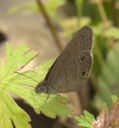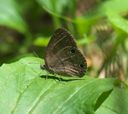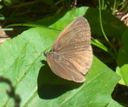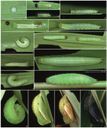Hodges#4575
Hermeuptychia sosybius
Classification
- Phylum: Arthropoda
- Subphylum: Hexapoda
- Class: Insecta
- Order: Lepidoptera
- Superfamily: Papilionoidea
- Family: Nymphalidae
- Subfamily: Satyrinae
- Tribe: Satyrini
- Genus: Hermeuptychia
- Species: sosybius
Pronunciation
How to pronounce Hermeuptychia sosybius: /hɛr.meʊpˈtɪkiə səˈsɪbiəs/
These audio files are automatically generated. While they are not always 100% accurate, they are a good starting point.
Images






Summary
Hermeuptychia sosybius, commonly known as the Carolina satyr, is a butterfly of the family Nymphalidae found primarily in the eastern United States. Recognizable by its brown wings and yellow-rimmed eyespots, it primarily inhabits grassy and woodland areas.
Physical Characteristics
Wingspan 32-38 mm; Adult has gray eyes with vertical stripes while alive; Wings dull brown with no eyespots on upperside; Underside has a dark dash in the middle of each wing and a series of yellow-rimmed eyespots along the edge.
Identification Tips
Distinguished from similar species like Megisto cymela by the absence of dark eyespots on the upperside and the configuration of the yellow-rimmed eyespots on the undersides.
Habitat
Grassy places, woodlands, forest edges, shaded lawns.
Distribution
Southern New Jersey south along the Atlantic Coast to southern Florida; west to southeastern Kansas, central Oklahoma, and central Texas; also found in Mexico and Central America.
Diet
Larvae feed on grasses such as Broadleaf Carpet Grass, Centipede Grass, Bosc's Panicgrass, Variable Panicgrass, Openflower Rosette Grass, Heller's Rosette Grass, and Wooly Rosette Grass. Adults feed on tree sap and rotting fruit, occasionally nectar on flowers.
Life Cycle
Three generations per year in northern parts of the range; more than three generations farther south. Larvae overwinter on hostplants and pupate in late winter.
Reproduction
Females in captivity have been observed ovipositing on St. Augustine Grass and Kentucky Bluegrass.
Evolution
Has been treated as part of the tropical American species Hermeuptychia hermes by some authors.
Tags
- butterfly
- Nymphalidae
- Carolina satyr
- Hermeuptychia sosybius
- entomology